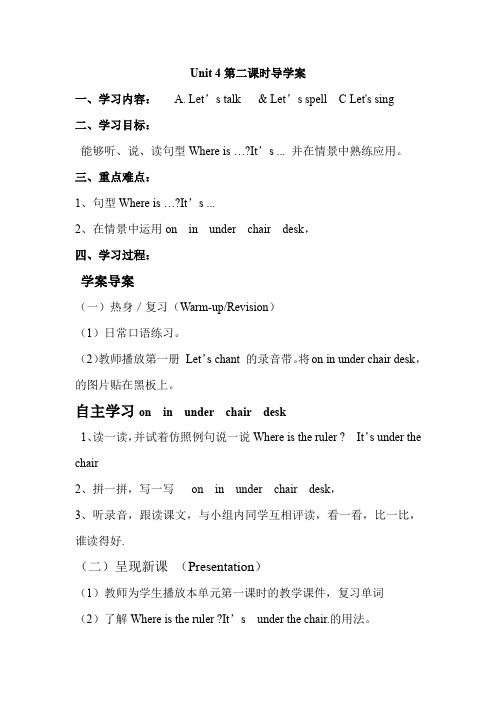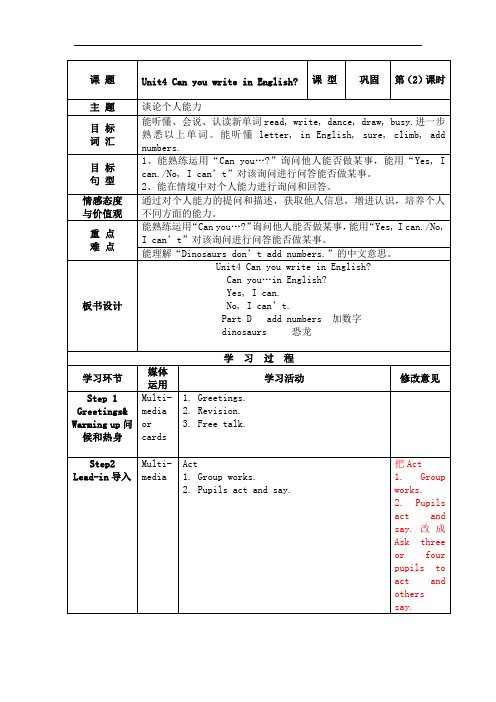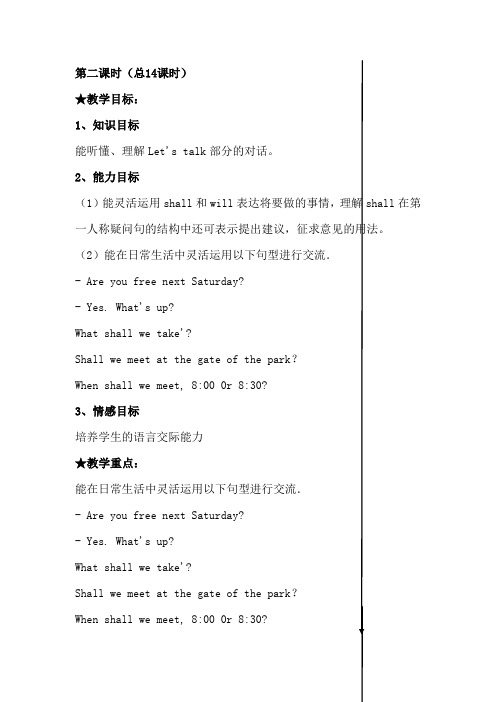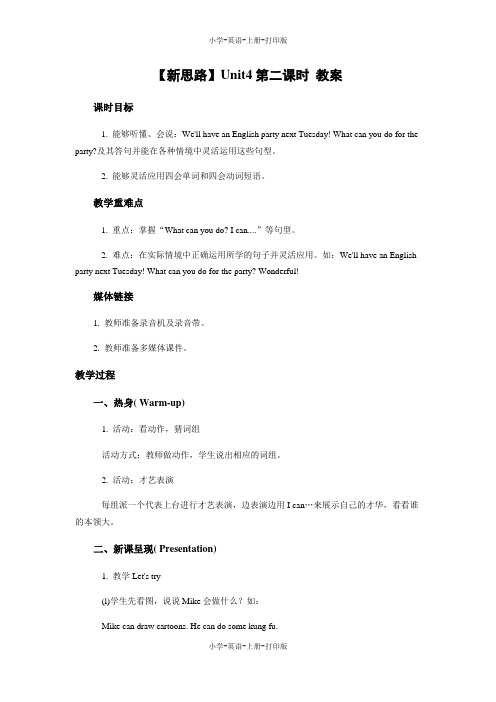Unit4,Welcome to our party-第二课时
Unit 4第二课时导学案

Unit 4第二课时导学案一、学习内容: A. Let’s talk & Let’s spell C Let's sing二、学习目标:能够听、说、读句型Where is …?It’s ... 并在情景中熟练应用。
三、重点难点:1、句型Where is …?It’s ...2、在情景中运用on in under chair desk,四、学习过程:学案导案(一)热身/复习(Warm-up/Revision)(1)日常口语练习。
(2)教师播放第一册Let’s chant 的录音带。
将on in under chair desk,的图片贴在黑板上。
自主学习on in under chair desk1、读一读,并试着仿照例句说一说Where is the ruler ? It’s under the chair2、拼一拼,写一写on in under chair desk,3、听录音,跟读课文,与小组内同学互相评读,看一看,比一比,谁读得好.(二)呈现新课(Presentation)(1)教师为学生播放本单元第一课时的教学课件,复习单词(2)了解Where is the ruler ?It’s under the chair.的用法。
(3)学生读课文,找出生单词,教师领读生词,go home, silly me.uh-oh。
学生已开火车的方式读单词,有错的要纠正。
(4)再次播放Let’s talk / A 部分的教学动画,让学生跟读对话中的句子,模仿发音,要求自然生动。
合作探究1.我能流利朗读“Let’s talk”对话。
1) 自由读。
2)小组长或推荐优秀组员领读。
3)分角色表演对话。
4) 其他方式。
2.我会根据Let’s play中图示,设计对话,进行练习。
(三)趣味操练(Practice)(1)将课件中的人声关闭,为其中的人物配音。
(2)让学生拿出事先准备好的书包,尺子,文具盒。
Unit4第二课时教学设计

句型
1、能熟练运用“Can you…?”询问他人能否做某事,能用“Yes, I can./No, I can’t”对该询问进行问答能否做某事。
2、能在情境中对个人能力进行询问和回答。
情感态度
与价值观
通过对个人能力的提问和描述,获取他人信息,增进认识,培养个人不同you…?”询问他人能否做某事,能用“Yes, I can./No, I can’t”对该询问进行问答能否做某事。
学习环节
媒体
运用
学习活动
修改意见
Step 1Greetings& Warming up问候和热身
Multi-media
or
cards
1. Greetings.
2. Revision.
3. Free talk.
Step2
Lead-in导入
Multi-media
Act
1. Group works.
2. Pupils act and say.
2. Look and guess.
3. Listen, repeat and underline the new words.
4. Act the dialogue.
Step 4 Consolidation & Assessment巩固和总结
Multi-media
1. Game.
2. Listen and read Part C and D.
能理解“Dinosaurs don’t add numbers.”的中文意思。
板书设计
Unit4 Can you write in English?
Can you…in English?
Yes, I can.
Unit4第二课时

Unit 4 Keeping Clean(第二课时)学习目标:1.知识目标(1)正确区分is,am,are和was,were在句子中表示不同的时态,能够用It was clean but it’s dirty now.进行替换说话。
(2)初步认识一般过去时的用法及构成。
(3)正确区分一般现在时和一般过去时,能运用到日常对话中去。
2.技能目标通过小组和同学之间的交流,巩固所学的知识,灵活拓展所学的知识,并能积极地用英语进行交流。
3.情感目标倡导保护坏境,要从身边的小事做起,保护坏境,人人有责。
学习过程:Ⅰ. 温故知新一.Everyday English.二.认真复习的我能:1.默写Unit 9 V ocabulary的单词。
—————————————————————————————————————————————————————————2.写出Be动词的现在式和过去式,并用它们来说句子。
_____________________________________________________________________________________________________________________Ⅱ. 学习Story一.教师点拨任务:(1)播放光盘,学生静看静听后跟读。
(2)小组内尝试朗读和理解课文内容。
(3)进行替换说话。
二.小组自主学习:看光盘,认真听对话——组内交流(充分发挥小组长的作用,做到以兵带兵,以兵练兵,以兵强兵,兵兵会读会理解的程度。
)我们组读的最好的同学是:_________________;进步最快的同学是:_________________。
三.我会展示学生以小组或个人等形式,以朗读、表演、讲解等形式展示对话。
【知识梳理】1. It was clean but it’s dirty now.这个句子用了两种时态。
It was clean.是一般过去时,表示过去某一时间里发生的动作,所以Be动词要用它对应的过去式was。
unit 4 第二课时

第二课时(总14课时) ★教学目标: 1、知识目标 能听懂、理解Let's talk部分的对话。 2、能力目标 (1)能灵活运用shall和will表达将要做的事情,理解shall在第一人称疑问句的结构中还可表示提出建议,征求意见的用法。 (2)能在日常生活中灵活运用以下句型进行交流. - Are you free next Saturday? - Yes. What's up? What shall we take'? Shall we meet at the gate of the park? When shall we meet, 8:00 0r 8:30? 3、情感目标 培养学生的语言交际能力 ★教学重点: 能在日常生活中灵活运用以下句型进行交流. - Are you free next Saturday? - Yes. What's up? What shall we take'? Shall we meet at the gate of the park? When shall we meet, 8:00 0r 8:30? ★教学难点: 能灵活运用shall和will表达将要做的事情,理解shall在第一人称疑问句的结构中还可表示提出建议,征求意见的用法 ★教学准备: 教师准备: (1) Let's talk及Listen and match部分的录音磁带、录音机。 (2)要展示的下列五个句子的课件或纸条: Let's go on a picnic at the foot ofthe mountains. We are free next Saturday. We shall meet at the gate of the park at 8:00. We shall get to the park early and come back early, I will go shopping tomorrow. ★教学过程: 一、课程导入(Leading In) 1.课前热身Part A Warming-up: Look and talk 教师进行课前提问,然后请几名学生回答问题,了解一下学生周末都 在做什么。此问答环节可参考如下: T: Hello, boys and girls. Nice to see you again. I'd like to know what you often do on weekends? Sl:I often go to the park. S2:I often help my parents do some housework. S3:… T·Well, Open your books and turn to Page 25. Look at the pictures and talk in pairs. 让学生看图,标记出各自在周末常做的活动图,然后两人一组仿照示 例进行对话。 2.新课导入 T:What day is it today? SS:It'S… T:The weekend is coming. You won't have classes on the weekend. You will be free. What will you do on Saturday and Sunday? Will you play sport's? Will you go on a picnic? 二、课程展示活动和过程的设计建议(Presentation) 1、新课展示 T:Tomorrow is Sunday. And the weather is fine. Are you free on Sunday? Let's go on a picnic, shall we? Shall we go on a picnic? Ss: Yes./Great! T: OK. We shall go on a picnic tomorrow. What shall we take? Shall we take some food and drinks? Ss: Yes. We can take... T: All right. And we shall take some fruits, too. 教师板书、朗读句型: We shall/ will go on a picnic tomorrow.我们明天要去野餐。 What shall we take?我们要带些什么呢? Shall we take some food and drinks?我们要带一些食物和饮料吗? 学习运用: Iwill/ shall go shopping on Sunday. What shall we have for supper this afternoon? Shall we meet at the school gate? 句中所用的shall,will是动词的将来时态,用来表示将要做的事或将要 出现的情况。就其用法教师可予以补充。 2、课文讲读、理解 (1)教师领读对话,然后让学生通过朗读、回答问题理解对话的大意。 T: Wu Chen and Alice will go on a picnic. They are talking about their plans. Please read the dialogue and try to answer the questions. Question l:Is Alice free next Sunday? Question 2:Where will they have the picnic? Question 3:When will they meet? Why? 教师随机点选学生回答问题,检测学生的听力理解水平。然后引导 学生用完整的句子说出问题的答案。 Answer 1:Yes, she is. Answer 2:They will have the picnic in the park. Answer 3:They will meet at 8:00. Because they want to get to the park early and come back early. (2)疑难讲解: - Are you free next Saturday?你下周六有空吗? - Yes. What's up?有。怎么了? What,s up?什么事?怎么啦?口语交流中用以询问对方有何需求或建议等。可让学生学习运用: - Can you help me? 一Yes. What's up? 3.巩固活动 1.教师播放Let's talk部分的录音,让学生跟读本部分的对话。 2.再次播放录音,同时用课件或纸条展示下列句子,学生根据听到的内容给下列句子排序。 ( ) Let's go on a picnic at the foot of the mountains. ( ) We are free next Saturday. ( ) We shall meet at the gate of the park at 8:00. ( ) We shall get to the park early and come back early. ( )1 will go shopping tomorrow. 教师让学生一起按排好的顺序读一读这些句子,通过这种方式逐步 训练学生简述对话内容。 三、操练活动的设计与实施建议(Practice Activities) 1、Part C Listen and match (1)教师先引导学生观察图片,说一说图意,如:mountain,rlver等。再熟悉 图下给出的人名,读一读,记一记。 (1)播放录音,学生听录音,完成连线题。 (3)教师带领学生试着说一说,核对答案。如: Peter will see a film. Tina will go on a picnic near the river. Kevin will go boating. Sun Yang will play ping-pong. Nancy will climb the mountains. (4)本部分录音内容如下: I、A: Peter, what shall we do this afternoon? B: How about seeing a film? A:Good idea! II、A: Hi, Tina. Let's go on a picnic this weekend. B: Great. But where shall we have it? A: Near the river. B: Great! III 、A: Kevin, shall we go skating tomorrow? B: I wouldn't like to do that. Why not go boating? A: OK. IV、A: Hi, Sun Yang. Let's play tennis. B: Sorry. I can't play termis. How about playing ping-pong? A: OK. V、 A: Nancy, where shall we go next Sunday'? B: Let's go to climb the mountains. A: Great! 2、Part B Ask and answer (1)教师请学生先读一读对话示范,画出活动要用的功能句,教师板书: What shall I do?不知自己未来活动应该怎么安排。 Will you…?给人提建议。 I wouldn't like to do that.表明自己不喜欢的活动。 What would you like to do?询问对方的喜好。 I'd like to…表明自己的喜好。 (2)学生读出Activity Bank中的短语。
Unit 4 Welcome to the unit 课件(24张PPT)

I. Choose the best answer。
1. I haven't decided _B__these books yet.
A. how to do with B what to do with C. how do with D. what do with
2. Mike is so tall that he can _c_ the apple
Victor Hugo
维克多 ·雨果
a French writer we can’t judge a person on法ly国b的y his or her appearance. 不能以貌取u人gly。丑陋的
Quasimodo 卡西莫多
touch 打动
Words preview
read n. 读物 [ri:d] cooking n. 烹饪,烹调 ['kʊkɪŋ]
B: Because ….
funny and
interesting
Watch and answer
Does Eddie like reading?
Read and answer
1. What did Eddie do after Hobo gave the books to him? He used the books to reach the box on the fridge.
Work in pairs and talk about the type of
book you like. A: What do you like to read in your
spare time? B: I like reading …. A: Why ?
பைடு நூலகம்
人教PEP版-英语-五年级上册-Unit4第二课时 教案

【新思路】Unit4第二课时教案课时目标1. 能够听懂、会说:We'll have an English party next Tuesday! What can you do for the party?及其答句并能在各种情境中灵活运用这些句型。
2. 能够灵活应用四会单词和四会动词短语。
教学重难点1. 重点:掌握“What can you do? I can....”等句型。
2. 难点:在实际情境中正确运用所学的句子并灵活应用。
如:We'll have an English party next Tuesday! What can you do for the party? Wonderful!媒体链接1. 教师准备录音机及录音带。
2. 教师准备多媒体课件。
教学过程一、热身( Warm-up)1. 活动:看动作,猜词组活动方式:教师做动作,学生说出相应的词组。
2. 活动:才艺表演每组派一个代表上台进行才艺表演,边表演边用I can…来展示自己的才华,看看谁的本领大。
二、新课呈现( Presentation)1. 教学Let's try(l)学生先看图,说说Mike会做什么?如:Mike can draw cartoons. He can do some kung fu.(2)学生听录音,做Let's try部分的练习,回答问题:“What can Mike do?”要求学生一边听,一边勾出Mike会做的事。
(3)教师说:Mike can draw pictures. He can do some kung fu. What can you do?教师边说边出示板书:What can you do?然后全班跟读,在跟读基础上学生两人一组进行问答练习。
2. 教学Let's talk(l)教师播放Let's talk部分的录音,学生听录音跟读,教师讲解“We'll have an English party next Tuesday. What can you do for the party? Wonderful!”等句子的中文意思。
